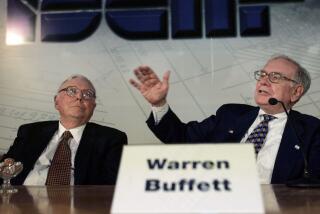Buffett Tells Teens: Spurn Plastic
- Share via
OMAHA — Some free advice to teenagers from billionaire investor Warren Buffett: Avoid credit cards.
“If you’re going to make progress, you will not do it by borrowing at 18 to 20% interest,” Buffett told about 380 Nebraska high school students Monday.
“Warren Buffett can probably give us more real-life examples than a teacher in economics class could,” said Reese Pearson, a 17-year-old senior from the southeast Nebraska community of Davenport.
In a forum on economics, the third-richest man in America and chairman of Berkshire Hathaway Inc. also urged the students to:
* Develop integrity, which guides intelligence and energy, three qualities Buffett said he looks for in hiring people. “If they don’t have the first one, integrity, the other two will kill ya.”
* Establish good habits, picking people to admire and following their example, while learning to weed out attributes that are not admirable. “If you do that, two or three years from now you’ll find out the person you admire most will be yourself.”
* Learn about companies before investing in them; do not rely on someone else’s advice.
* Choose professions for love of the work, not the money. Doing well in the United States is not far removed from being rich, said Buffett, who added with self-effacing humor: “I’ll pay more for my suits than you will, but as soon as I put it on, it will look cheap on me.”
Students gathered from across the state for the event organized by U.S. Sen. Bob Kerrey (D-Neb.). They talked about savings and investment, and filled out budgets based on the average starting salary for college graduates in Nebraska.
The students also heard from the Rev. Jesse Jackson, civil rights leader and two-time presidential candidate, who spoke via speakerphone from Los Angeles.
Jackson said energy and focus are needed for financial success and that those qualities can help students avoid the pitfalls of drugs and violence.
Jackson also urged the students to help close the gap between rich and poor in America. Capital and resources need to be more accessible to the disadvantaged, Jackson said.
More to Read
Inside the business of entertainment
The Wide Shot brings you news, analysis and insights on everything from streaming wars to production — and what it all means for the future.
You may occasionally receive promotional content from the Los Angeles Times.










